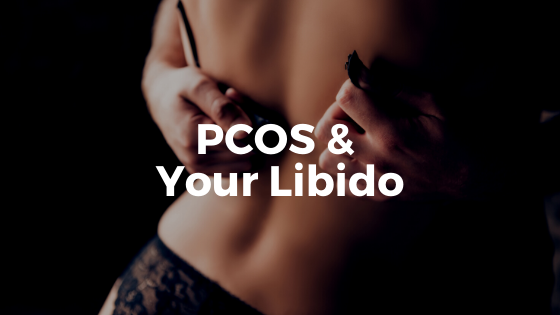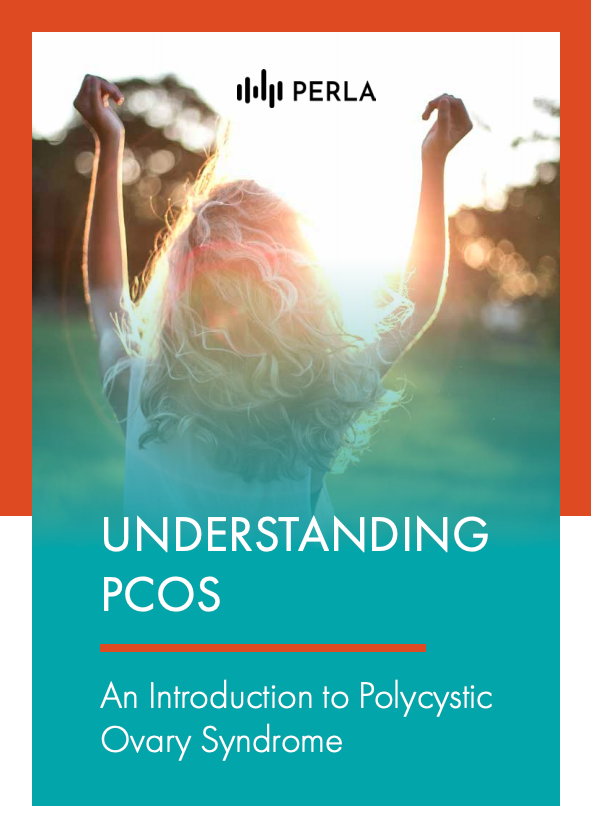Low sex drive or also called low libido in women has many potential causes, which include stress, anxiety, negative body image, and an underlying medical problem like PCOS. Learn how PCOS can affect your sex drive and what you can do about it.
PCOS and Sexual Intimacy
Sexual intimacy has long been recognized as an essential part of human life.1,2 From burning calories and reducing cardiovascular risk3 to improving memory4 and boosting the immune system,5 science tells us that sex is beneficial to our health. But sex and romance don’t always come easy, especially in women with chronic conditions like PCOS.
If you think PCOS is messing with your libido and sexual satisfaction, you are not alone. Infrequent periods, hirsutism, acne, and weight gain are some of the tell-tale signs of PCOS, a condition that increases androgen levels and causes hormone imbalance. The physical and mental changes caused by high testosterone levels can mess with a woman’s sex life.
If your lack of interest in sex is distressing and is interfering with your relationship, talk to your PCOS care team. Know that several approaches are available to help you and your partner.
How PCOS Affects Your Sex Drive
Our understanding of sex and the nature of sexual desire have evolved and expanded since Freud’s time. Modern women are persuaded to embrace their femininity and to feel good about themselves. But that’s quite a challenge if you’re dealing with symptoms of PCOS such as persistent acne, belly fat, and excess facial and body hair. Below are some of the ways PCOS affects your libido:
Body image issues
For many women, their intimacy issues are impacted by their body image and their own self-consciousness. A study involving 12,000 adults found that women are more likely to struggle with body dissatisfaction than men6 and having PCOS increases that risk. 7 Commonly reported sexual problems in women are lack of sexual interest and inability to reach orgasm. 8,9
Women with PCOS often have a negative perception of their body image, described as:10
- Perceived loss of femininity
- Feeling less sexually attractive
- Self-consciousness and dissatisfaction with appearance
Hormonal Contraceptives
Studies on the effects of hormonal birth control on sexual function have conflicting results. While most studies found that some forms of hormonal contraception have no impact on sexual functioning, other women experienced either lack of interest in sex or improved sexual functioning. Women on birth control pills are more likely to experience decreased libido, arousal, and pleasure,11 while hormonal IUDs are associated with more sexual desire and lower levels of sexual dissatisfaction.12 The bottom line is that your choice of contraceptives to treat your PCOS may negatively or positively impact your libido. If you have concerns about your birth control method and how it’s affecting your sex drive, talk to your healthcare provider.
Fertility Problems
PCOS is the leading cause of anovulatory infertility in women.13 Being overweight or obese exacerbates this problem. The risk of anxiety, distress, and depression are high in women who are struggling to get pregnant. The extreme emotional turmoil that women who struggle with infertility experience has been compared to those who have been diagnosed with cancer of HIV.14 Couples dealing with infertility may suffer from anxiety-related sexual dysfunction and other marital conflicts.
Hormonal Imbalances
Women with PCOS often have too high androgen levels. Researchers believe that this can throw a woman’s hormones out of whack and cause low libido and low sexual satisfaction. 15,16
In some women, their sexual drive remains the same but they struggle with sexual dysfunction such as dyspareunia (pain during sex) and anorgasmia (difficulty reaching orgasm).
Irregular Periods
The hormone imbalance in PCOS can cause irregular menstruation. Most women with abnormal periods find it difficult to track their cycle, which makes planning for a romantic evening a challenge. Some women with PCOS experience bleeding between periods or with sexual intercourse. Others bleed heavier than normal which could last for weeks without medical intervention.
What can be done?
- Manage your PCOS: Losing weight through diet and exercise and changing other lifestyle factors can reduce PCOS symptoms and normalize your menstrual cycle.
- Avoid comparisons: The habit of comparing yourself to others (whether online or in person) can actually increase body dissatisfaction. People come in all shapes and sizes, so it’s important to work on your self-love, self-acceptance and confidence.
- Build your sexual confidence: Pay attention to your feelings and needs. Explore your sexual interests and communicate your sexual desires with your partner.
- Seek emotional support from your partner: Women with partners who are critical of their partner’s appearance are more likely to have a negative body image. A partner who understands your needs to feel desirable or loved boosts your sexual confidence, which can lead to higher relationship satisfaction.
Sources:
- Satcher D. The Surgeon General’s Call to Action to Promote Sexual Health and Responsible Sexual Behavior. American Journal of Health Education. 2001;32(6):356-368. doi:10.1080/19325037.2001.10603498
- David Morris Schnarch. Constructing the Sexual Crucible: An Integration of Sexual and Marital Therapy. Norton; 1991.
- Liu H, Waite LJ, Shen S, Wang DH. Is Sex Good for Your Health? A National Study on Partnered Sexuality and Cardiovascular Risk among Older Men and Women. J Health Soc Behav. 2016;57(3):276-296. doi:10.1177/0022146516661597
- Wright H, Jenks RA. Sex on the brain! Associations between sexual activity and cognitive function in older age. Age and Ageing. 2016;45(2):313-317. doi:10.1093/ageing/afv197
- Charnetski CJ, Brennan FX. Sexual Frequency and Salivary Immunoglobulin A (IgA). Psychological Reports. 2004;94(3):839-844. doi:10.2466/pr0.94.3.839-844
- Frederick DA, Sandhu G, Morse PJ, Swami V. Correlates of appearance and weight satisfaction in a U.S. National Sample: Personality, attachment style, television viewing, self-esteem, and life satisfaction. Body Image. 2016;17:191-203. doi:10.1016/j.bodyim.2016.04.001
- Weiner CL. Androgens and Mood Dysfunction in Women: Comparison of Women With Polycystic Ovarian Syndrome to Healthy Controls. Psychosomatic Medicine. 2004;66(3):356-362. doi:10.1097/01.psy.0000127871.46309.fe
- Heiman JR, Rupp H, Janssen E, Newhouse SK, Brauer M, Laan E. Sexual desire, sexual arousal and hormonal differences in premenopausal US and Dutch women with and without low sexual desire. Hormones and Behavior. 2011;59(5):772-779. doi:10.1016/j.yhbeh.2011.03.013
- Laumann EO, Nicolosi A, Glasser DB, et al. Sexual problems among women and men aged 40–80 y: prevalence and correlates identified in the Global Study of Sexual Attitudes and Behaviors. International Journal of Impotence Research. 2004;17(1):39-57. doi:10.1038/sj.ijir.3901250
- Kitzinger C, Willmott J. ‘The thief of womanhood’: women’s experience of polycystic ovarian syndrome. Soc Sci Med. 2002;54(3):349-361. doi:10.1016/s0277-9536(01)00034-x
- Zethraeus N, Dreber A, Ranehill E, Blomberg L, Labrie F, von Schoultz B, et al. Combined oral contraceptives and sexual function in women—a double-blind, randomized, placebo-controlled trial. J Clin Endocrinol Metab. 2016 Aug 15;101(11):4046-53. From <https://pubmed.ncbi.nlm.nih.gov/11824912/>
- Bastianelli C, Farris M, Benagiano G. Use of the levonorgestrel-releasing intrauterine system, quality of life and sexuality. Experience in an Italian family planning center. Contraception. 2011 Oct 1;84(4):402-8.
- Balen AH, Rutherford AJ. Managing anovulatory infertility and polycystic ovary syndrome. BMJ. 2007;335(7621):663-666. doi:10.1136/bmj.39335.462303.80
- Domar AD, Zuttermeister PC, Friedman R. The psychological impact of infertility: a comparison with patients with other medical conditions. J Psychosom Obstet Gynaecol. 1993;14 Suppl:45-52.
- Veras AB, Bruno RV, de Avila MA, Nardi AE. Sexual dysfunction in patients with polycystic ovary syndrome: clinical and hormonal correlations. Compr Psychiatry. 2011;52(5):486-489. doi:10.1016/j.comppsych.2010.10.013
- Stovall DW, Scriver JL, Clayton AH, Williams CD, Pastore LM. Sexual function in women with polycystic ovary syndrome. J Sex Med. 2012;9(1):224-230. doi:10.1111/j.1743-6109.2011.02539.x


